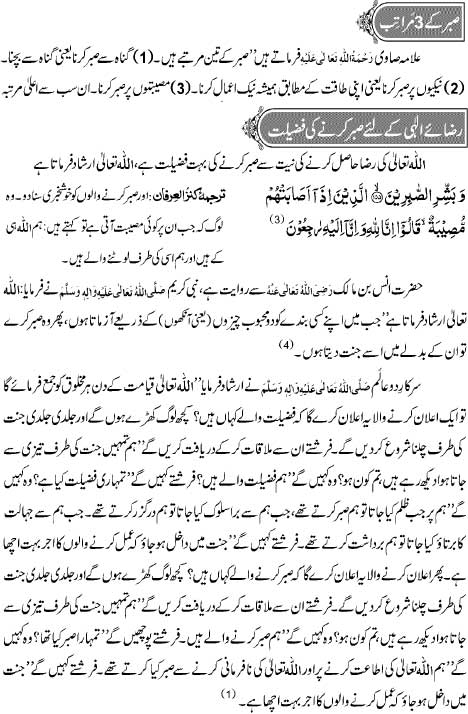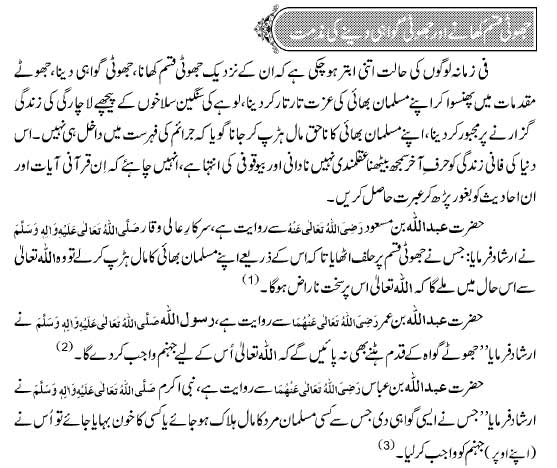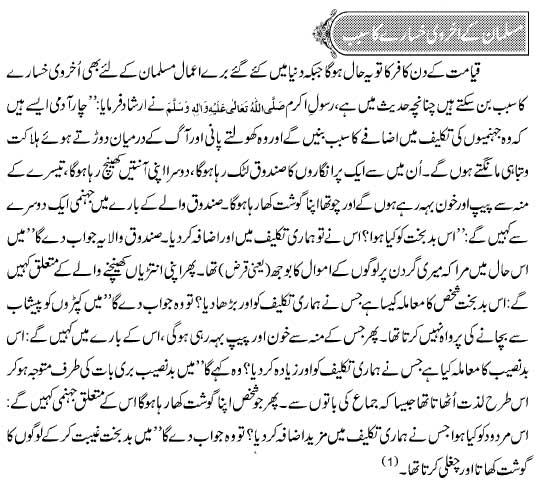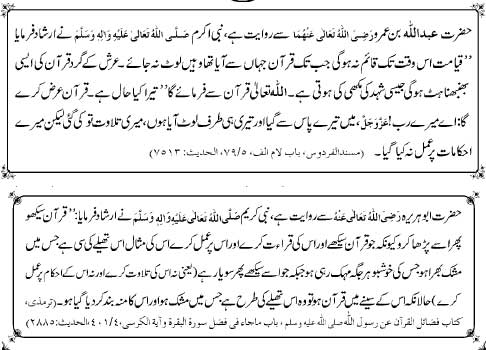
A Loving Father
While Abu- Dardaa (R.A. – may Allah be pleased with him) was in Damascus, Muawiyah ibn Abi Sufyan, its governor, asked him to give his daughter in marriage to his son, Yazid. Abu- Dardaa did not agree. Instead he gave his daughter in marriage to a young man from among the poor whose character and attachment to Islam pleased him. People heard about this and began talking and asking: Why did Abu- Dardaa refuse to let his daughter marry Yazid? The question was put to Abu- Dardaa himself and he said: “I have only sought to do what is good for ad-Dardaa (his daughter).”
How?” inquired the person.
“What would you think of ad-Dardaa if servants were to stand in her presence serving her and if she were to find herself in palaces the glamour of which dazzled the eyes? What would become of her religion then?” (He desired to protect her and her faith from the pomp and glitter that world has to offer).
Amazing father Subhan Allah.
Relations Set On New Footing
There are strong similarities between the circumstances leading to the marriages of the Prophet (peace be upon him) to Juwayriyyah bint Al-Harith and Safiyyah bint Huyayy. Both were daughters of men who took a hostile attitude to Islam and the Prophet. Fathers of both women raised forces to wage war against Islam. Both women were married to men who were killed in the battles that their peoples were keen to fight. Both were taken captive and faced a life of slavery. Both were freed by the Prophet and offered marriage.
One must not underestimate the significance of such marriages, especially in the tribal environment of Arabia, where marriage relations between the families of the chiefs of different tribes signified alliances between those tribes. In the case of his marriage with Safiyyah, the Prophet wanted his companions and the vanquished Jews to realize that he was opening a new page in his relations with yesterday’s enemies. He realized that his marriage would go a long way to reassure the Jews that the door was open for them to have friendly relations with Islam. The Prophet would not have married Safiyyah had he intended not to treat her on equal footing with his other wives. On the contrary, we see him extending a most kindly treatment to her right from the beginning. As the Muslim army began its march back toward Madinah, and Safiyyah needed to climb into her howdah, she found that difficult because she was short. The Prophet bent his knee and she stepped over it so that she could manage to climb. This took place in front of his companions. He could have ordered that steps should be brought for her, but he preferred to be the one to help her. He thus taught by example that men should extend every kindness to their women folk. That practical example was very significant in a social environment that until a short while earlier looked at women as much inferior. Islam changed all this and established the full equality of the two sexes.
How did she take such a change in her circumstances? We have little evidence to tell us how she felt at first. However, one report suggests that when the Prophet wanted this new marriage consummated, Safiyyah kept aloof. He did not try to force her. Rather, he left her, and felt rather uneasy. A few days later, as the Muslim army marched on its way back to Madinah, the consummation took place. She later explained that she did not wish the consummation to take place so close to her people’s hometown, because “I feared that the Jews might try to do you harm.”
That uneasy feeling was also felt by some Muslims. When the Prophet had his first night with Safiyyah, Abu Ayyub Al-Ansari, his companion who was his host on his first arrival in Madinah, spent the night at close proximity to the Prophet’s tent, watching for any suspicious indication. The Prophet did not realize that he acted as a night watch. It was when he went out of his tent that he realized Abu Ayyub’s presence. He asked him what kept him awake. He said: “Messenger of God! We had just defeated this woman’s people and killed many of their men. I feared that she might entertain some evil thoughts against you.” The Prophet thanked him and prayed God to preserve him as he stood guard for him.
Thus, apprehension was felt by Safiyyah and by some Muslims. Yet there was no need. Safiyyah adopted Islam and was a devout and pious Muslim.
Adil Salahi
- September, 23
- 2023
- Prophet Character
- More
Jhooti Qasam Aur Jhooti Gawahi

Jhooti Qasam Aur Jhooti Gawahi
The Prophet Among His Family Members
Muhammad the last Prophet and Messenger of Allah (peace be upon him) is the exemplary character that all Muslims must emulate. His way is the straight path that a Muslim has to follow in order to succeed in this world and in the hereafter.
The Prophet (peace be upon him) despite being the Messenger of Allah, was a human being, and therefore he did and said things which even ordinary people can easily understand and follow. The Prophet (peace be upon him) had exemplary patience, a capacity to bear hardship and ability to forgive the erring people, especially the ones who ever ‘wronged’ him in one way or the other.
He also had the ability to be steadfast and resolute in the face of persecution. He kept his promises, fought bravely when attacked, was generous in giving, content with what he had, honest, clean-hearted, kind and compassionate. He always worshiped Allah in sincerity, behaved with people in a humane manner, loved children and respected the womenfolk. In sum, in him was Uswa Hasana, the exemplary character: The Prophet (peace be upon him) was the finest human being.
Men are judged in many ways. But the best scale to judge the character of a man is to see how good he is to the members of his family, especially to his wife. Because husband and wife know each other in a way that others, even parents cannot. A wife knows even those aspects of man’s personality that he can hide from others. This is the reason that a wife’s testimony about her husband’s character is regarded as the most authentic.
When the Prophet (peace be upon him) received the first revelation in the Cave of Hira, he naturally became a bit apprehensive. In such a state of mind he went to no one but to his wife. And what Khadijah told him enumerating his good qualities is remarkable indeed. Imam Bukhari has narrated this story in the beginning of his magnum opus, Sahih, because it contains Khadijah’s testimony about the character and personality of the Prophet (peace be upon him). And this testimony has come from a woman who was witness to even those aspects of the Prophet’s life that others were not in a position to know.
It would, therefore, be rewarding to know as to how the Prophet (peace be upon him) behaved with his wives? It just so happens that people forget the real message or miss the spirit of the message and take their cultural habits as real things, even give them precedence and superiority over matters which are more essential. This is truer about our attitude towards women than anything else. Over the centuries, we have developed an attitude which deprives women even of the rights that the Holy Qur’an had given them. Women have all the rights to get educated and contribute to the welfare of the Ummah in befitting manners.
But we, the Muslims, have confined them within the four walls of their homes and do not do enough for their proper education. The Prophet (peace be upon him) had made it compulsory for both Muslim men and women to acquire knowledge. The Ummah must introspect and think what it has done so far for educating half of its population.
When we study the life of the Prophet (peace be upon him) we discover to our amazement that he was as much eager to teach women as he was about his male companions. Women were free to approach the Prophet (peace be upon him) and seek guidance from him. He never thought of them as a source of evil as some people think so today, and consequently deprive them of the opportunities that they deserve to have as a matter of right.
Some Muslims are harsh even toward their wives despite clear Islamic injunctions against such a treatment of women. Some think that being lenient to one’s children and wife is tantamount to spoiling them, and hence they never have fun or play with them. It would be advisable here to recount how the Prophet (peace be upon him) lived and behaved with his wives.
- September, 20
- 2459
- Prophet Character
- More
Musalman Kay Ukharwi Khasaray Ka Sabab

The People Of Hell And Their Evil Deeds
1. The People Who Will Abide Therein Forever
The people of Hell who will abide therein forever, never leaving it and never dying, are the disbelievers and polytheists. Allah (swt) says:
“But those who reject Allah, for them will be the Fire of Hell. No term shall be determined for them, so they should die, nor shall its penalty be lightened for them”. (35:36)
“But those who reject Faith and belie Our Signs, they shall be companions [or dwellers] of the Fire; they shall abide therein”. (2:39)
“Verily those who reject faith and die rejecting – on them is Allah’s Curse and the Curse of the Angels and of all mankind. They will abide therein: their penalty will not be lightened, nor will respite be their lot.” (2:161-162)
“Know they not that for those who oppose Allah and His Messenger is the Fire of Hell – wherein they shall dwell? That is the supreme disgrace”. (9:63)
“It is not for such as join gods with Allah to visit or maintain the Mosques of Allah while they witness against their own souls to infidelity [or disbelief]. The works of such bear no fruit: In Fire shall they dwell.” (9:17)
Because they will abide therein forever, Allah (swt) described the torment of Hell as a lasting torment, one that will never end, one that is eternal:
“Their wish will be to get out of the Fire, but never will they get out therefrom: their Penalty will be one that endures”. (5:37)
“At length it will be said to the wrongdoers: “Taste you the enduring punishment! You get but the recompense of what you earned!” (10:52)
Death will be slaughtered, as is stated in the hadith narration from Ibn ‘Umar by al-Bukhaari and in Muslim from Abu Sa’eed who said:
“The Messenger of Allah of Allah (saw) said: “Death will be brought like a horned ram, and will be made to stand between Paradise and Hell”. It will be said, “O people of Paradise, do you know what this is?” They will raise their heads and look, and will say, “Yes, this is death”. It will be said, “O people of Hell, do you know what this is?” They will raise their heads and look, and will say, “Yes, this is death”. Then the command will be given for death to be slaughtered. Then it will be said, “O people of Paradise, it is eternal, there is no death. O people of Hell, it is eternal, there is no death”. Then the Messenger of Allah (saw) recited:
“And warn them of the Day of Grief and regrets when the case has been decided, while [now] they are in a state of carelessness, and they believe not”. (19:39)
and in the narration of at-Tirmidhi, Abu Sa’eed al-Khudree added: “If any were to die of joy it would be the people of Paradise and if any were to die of despair, it would be the people of Hell”. (at-Tirmidhi, said “This is a sahih hasan hadith”).
2. Hell will be the Dwelling Place of the Kuffar and Mushrikeen
Because the disbelievers and polytheists will remain in Hell forever, it is considered to be their abode or dwelling place, just as Paradise is the abode of the believers:
“Their abode will be the Fire; and evil is the home of the wrongdoers” (3:151)
“Their abode is the Fire, because of the [evil] they earned”. (10:8)
“Is there not a home in Hell for those who reject Faith?” (29:68)
Hell is abode that they deserve:
“Your abode is the Fire: that is the proper place to claim you…” (57:15)
Hell is the worst abode and destination:
“But for the wrongdoers will be an evil place of [final] Return! – they will burn therein – an evil bed [indeed to lie on]!” (38:55-56)
3. Those Who Call Others to Hell
Those who follow misguided beliefs and ideologies that contradict the laws of Allah (Swt) and those who believe in their false causes, these are the ones who call others to Hell:
“Those [unbelievers] do [but] beckon you to the Fire..” (2:221)
“And We made them [but] leaders inviting to the Fire; and on the Day of Judgement no help shall they find”. (28:41)
One of them is Shaytaan:
“..[would they do so] even if it is Shaytaan beckoning them to the Penalty of the [Blazing] Fire?” (31:21)
“He [Shaytaan} only invites his adherents that they may become Companions of the blazing Fire” (35:6)
Those who call others to the Fire in this world will lead their people and their followers to the Fire in the Hereafter. An example is Pharaoh:
“He will go before his people on the Day of Judgement, and lead them into the Fire.” (11:98)
All evil leaders who call people to their belief systems that go against Islaam are in fact calling people to the Fire of Hell, because the only way to escape the Fire of Hell and enter Paradise is to follow the path of Faith:
“And O my people! [strange] it is for me to call you to salvation while you call me to the Fire!” (40:41)
This man’s people were calling him to the kufr and shirk of Pharaoh while he was calling them to Tawheed and faith in Allah (swt). Because the kuffaar invite people to the Fire, Allah (swt) forbade believing men to marry mushrik women, just as He forbade believing women to marry mushrik men:
“And do not marry unbelieving (literally, polytheist) women until they believe. A slave woman who believes is better than a [free] unbelieving woman, even though she allures you. Nor marry [your girls] to unbelievers until they believer; a male slave who believes is better than a [free] unbeliever, even though he allures you. Those [unbelievers] do [but] beckon you to the Fire, but Allah invites by His Grace to the Garden [of Bliss] and forgiveness, and makes His Signs clear to mankind that they may receive admonition” (2:221)
- September, 18
- 2939
- Paradise-Hell
- More
Wearing Gold Is Haram For Men
`Abdullah ibn `Abbaas reported that the Prophet (sallallahu alayhi wa sallam) saw a gold ring on a man’s hand. He took it off and threw it aside, saying, “Would any of you take a burning coal and hold it in his hand?” When the Messenger of Allah (salla llahu alayhi wa sallam) had gone away, someone said to the man, “Take your ring and benefit from it (i.e., sell it).” He said, “No, by Allah, I will not take it after the Messenger of Allah (salla llahu alayhi wa sallam) has thrown it away.” (reported by Muslim, no. 2090).
`Abdullah ibn `Amr ibn al’Aas reported that the Messenger of Allah (sallallahu alayhi wa sallam) said: “Whoever of my ummah wears gold and dies wearing it, Allah will deny him the gold of Paradise. Whoever of my ummah wears silk and dies wearing it, Allah will deny him the silk of Paradise.” (Reported by Imaam Ahmad).
This prohibition applies to men only, not to women, as `Ali, radiyallahu anhu, reported that the Prophet of Allah(sallallahu alayhi wa sallam) took a piece of silk in his right hand and a piece of gold in his left, and said: “These are forbidden for the males of my ummah.” (reported by al-Nisaa’i and Abu Dawud).
The Prophet (salla llahua alayhi wa sallam) also said: “Wearing silk and gold is permitted for the women of my ummah and prohibited for the males.” (Reported by Imaam Ahmad)
Quran Sekho

Virtues Of The Month Of Muharram
A Muslim is to be keen to get closer to Allah and draw nearer to Him all the time. Such keenness gains more weight and significance during blessed occasions and times. One of these occasions in which a Muslim should exert more effort and show more keenness is the month of Muharram.
To shed more light on the significance of worship in this blessed month we would like to cite for you the following:
Indeed, the sacred month of Muharram is a blessed and important month. It is the first month of the Hijri calendar and is one of the four sacred months concerning which Allah says, “Verily, the number of months with Allah is twelve months (in a year), so it was ordained by Allah on the Day when He created the heavens and the earth; of them, four are sacred. That is the right religion, so wrong not yourselves therein” (At-Tawbah 9: 36)
Abu Bakrah (may Allah be pleased with him) reported that the Prophet (peace and blessings be upon him) said: “Time has come back to its original state which it had when Allah created the Heavens and the Earth; the year is twelve months, four of which are sacred. Three of them are in succession: Dhul-Qa`da, Dhul-Hijja and Al-Muharram, and (the fourth being) Rajab Mudar (named after the tribe of Mudar as they used to respect this month) which stands between Jumad (ath-Thani) and Sha`ban.”
Muharram is called so because it is a sacred (muharram) month and to confirm its sanctity. Allah Almighty says, “so wrong not yourselves therein”, which means do not wrong yourselves in these sacred months, because sin in these months is worse than in other months.
It was reported that Ibn `Abbas (may Allah be pleased with him) said regarding the above verse that these four months were singled out and made sacred. Sins in these months are more serious and good deeds bring a greater reward.
Qatadah (may Allah be pleased with him) said concerning this phrase (so wrong not yourselves therein) that wrongdoing during the sacred months is more serious and more sinful than wrongdoing at any other time. Wrongdoing at any time is a serious matter, but Allah gives more weight to whichever of His commands He will. Allah has chosen certain ones of His Creation. He has chosen from among the angels Messengers and from among mankind Messengers. He chose from among speech His remembrance or dhikr. He chose from among the earth the mosques, from among the months Ramadan and the sacred months, from among the days Friday and from among the nights laylat al-qadr, so venerate that which Allah has told us to venerate. People of understanding and wisdom venerate the things that Allah has told us to venerate.
(Summarized from the Tafseer of Ibn Kathir, may Allah have mercy on him. Tafseer of Surat at-Tawbah, verse 36).

